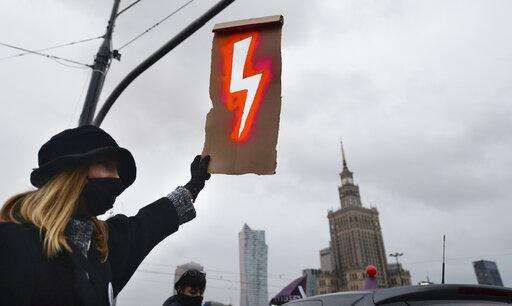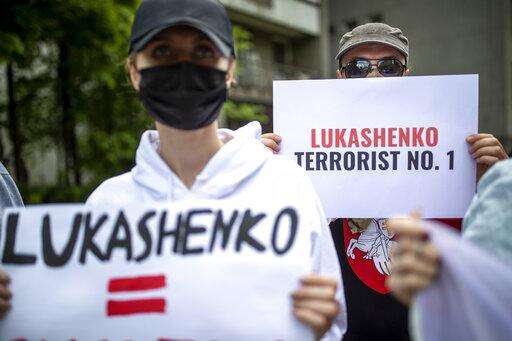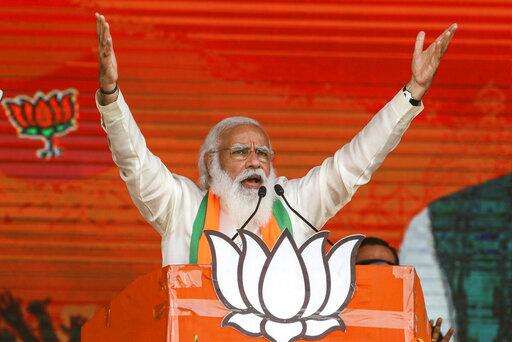FILE - In this Monday, Nov. 30, 2020 file photo, a man protests the policies of Hungarian Prime Minister Viktor Orban during Orban's talks with Poland's Prime Minister Mateusz Morawiecki in Warsaw, Poland. The coronavirus pandemic has upended life around the globe, but it has hasn't stopped the spread of authoritarianism and extremism. Some researchers believe it may even have accelerated it, but curbing individual freedoms and boosting the reach of the state. Since COVID-19 hit, Hungary has banned children from being told about homosexuality. China shut Hong Kong's last pro-democracy newspaper. Brazil's president has extolled dictatorship. Belarus has hijacked a passenger plane. A Cambodian human rights lawyer calls the pandemic 'a dictator's dream opportunity.' But there are also resistance movements, as protesters from Hungary to Brazil take to the streets to defend democracy. (AP Photo/Czarek Sokolowski, File)
The Associated Press
LONDON (AP) - Here's some of what happened while the world was distracted by the coronavirus: Hungary banned the public depiction of homosexuality. China shut Hong Kong's last pro-democracy newspaper. Brazil's government extolled dictatorship. And Belarus hijacked a passenger plane to arrest a journalist.
COVID-19 has absorbed the world's energies and isolated countries from one another, which may have accelerated the creep of authoritarianism and extremism across the globe, some researchers and activists believe.
'œCOVID is a dictator's dream opportunity,'ť said Theary Seng, a Cambodian-American human rights lawyer who has been indicted on charges including treason in the ostensibly democratic southeast Asian nation, where Prime Minister Hun Sen has been in power for more than three decades.
Human Rights Watch accuses Cambodia's government of using the pandemic as cover to imprison political opponents without due process. Scores have been indicted and face mass trials.
When it comes to government opposition, 'œthe fear of COVID, on its own and as a political weapon, has substantially restricted mobility for a gathering or movement to take shape,'ť Seng said.
The biggest global public health emergency in a century has handed power to government authorities and restricted life for billions of people.
Luke Cooper, a London School of Economics researcher and author of the book 'œAuthoritarian Contagion,'ť said the vast economic, health and social resources poured into fighting the pandemic mean 'œthe state is back as a force to manage society and to deliver public goods.'ť
Restrictions on civil liberties or political opponents have been stepped up during the pandemic on several continents.
For a decade in Hungary, conservative nationalist Prime Minister Viktor Orban has curtailed media and judicial freedom, criticized multiculturalism and attacked Muslim migrants as a threat to Europe's Christian identity.
During the pandemic, Orban's government brought in an emergency powers bill allowing it to implement resolutions without parliamentary approval -- effectively a license to rule by decree. In June, it passed a law prohibiting the sharing of content portraying homosexuality or sex reassignment with anyone under 18. The government claims the purpose is to protect children from pedophiles, but it effectively outlawed discussion of sexual orientation and gender identity in schools and the media.
Poland's conservative government has chipped away at the rights of women and gay people. A ruling last year by a government-controlled court that imposed a near-total ban on abortion triggered a wave of protests that defied a ban on mass gatherings during the virus outbreak.
In India, the world's biggest democracy, populist Prime Minister Narendra Modi has been accused of trying to silence voices critical of his administration's response to a brutal pandemic wave that tore through the country in April and May. His government has arrested journalists and ordered Twitter to remove posts that criticized its handling of the outbreak after introducing sweeping regulations that give it more power to police online content.
Even before the pandemic, Modi's ruling Hindu nationalist Bharatiya Janata Party was accused by opponents of squashing dissent and introducing policies aimed at refashioning a multifaith democracy into a Hindu nation that discriminates against Muslims and other minorities.
In Russia, the government of President Vladimir Putin has used the pandemic as its latest excuse to arrest opposition figures. Associates of jailed opposition figure Alexei Navalny have been subjected to house arrest and charges that the mass protests against his arrest violated regulations on mass gatherings.
In neighboring Belarus, authoritarian President Alexander Lukashenko extended his quarter-century iron grip on power by winning an August 2020 election that the opposition -- and many Western countries -- said was rigged. The huge protests that erupted were met with tear gas, rubber bullets and mass arrests.
Then, in May, a Ryanair plane flying from Athens to Vilnius was forced to land in the Belarusian capital of Minsk after the crew was told of an alleged threat. Opposition journalist Raman Pratasevic, a passenger, was taken off the plane along with his girlfriend and arrested.
Western nations called the forced diversion a brazen hijacking and slapped sanctions on Belarus, but those seem unlikely to induce Lukashenko to change his ways and underscore the weakness of democracies in confronting hardline regimes. Hungary's acts have drawn sharp words from fellow European Union leaders, but the 27-nation bloc has no unified response to restrictive regimes like those in Hungary or Poland.
Even before COVID-19 came along, extremism was on the march.
'œOver the last 15 years, authoritarian politics has replicated all over the world,'ť Cooper said. 'œDemocracy feels very fragile. Democracy doesn't have a clear vision for what it's trying to do in the 21st century."
The 2008 global financial crisis, which saw governments pump billions into teetering banks, shook confidence in the Western world order. And the years of recession and government austerity that followed boosted populism in Europe and North America.
In China, authorities saw the 2008 economic crash as evidence that they, and not the world's democracies, were on the right path.
Historian Rana Mitter, director of the University of Oxford China Center, said the crisis persuaded China's communist government that 'œthe West no longer had lessons to teach them.'ť Since then, Beijing has increasingly flexed China's economic muscle abroad while cracking down on opposition inside its borders.
In recent years, hundreds of thousands of Muslim Uyghurs have been confined in re-education camps in China's western Xinjiang region, where activists and former detainees accuse authorities of imposing forced labor, systematic forced birth control and torture. Beijing instead characterizes the camps as vocational training centers.
Beijing also has tightened control on Hong Kong, stifling dissent in the former British colony. Protesters, publishers and journalists critical of Beijing have been jailed and the last remaining pro-democracy newspaper, Apple Daily, stopped publishing in June after the arrest of its top editors and executives.
When the coronavirus first emerged in the Chinese city of Wuhan, authorities responded firmly -- though far from transparently -- with draconian lockdowns that got the virus in check.
Mitter said the pandemic has cemented a view -- among many ordinary Chinese, as well as the country's leaders -- 'œthat something had gone very wrong in terms of the way in which the democratic world had dealt with the virus, and something had gone right in China.'ť
'œThat is now being used very much as a lesson, not just about the pandemic, but about the virtues of China's system as opposed to the systems of liberal countries,'ť he said.
Last year, curfews and travel restrictions also became commonplace across Europe. People in France needed to show a signed declaration to travel more than 1 kilometer (just over a half-mile) from home. And Britons were banned by law from going on vacation abroad, while some attendees at a London vigil for a murdered woman were arrested for gathering illegally.
British lawmakers have expressed concern about the scope of the Conservative government's emergency powers, many passed without debate in Parliament.
'œSince March 2020, the government has introduced a large volume of new legislation, much of it transforming everyday life and introducing unprecedented restrictions on ordinary activities,'ť said Ann Taylor, an opposition Labour Party politician who chairs the House of Lords Constitution Committee. 'œYet parliamentary oversight of these significant policy decisions has been extremely limited.'ť
Politicians and intelligence agencies in the West also have warned of the threat from coronavirus conspiracy theories that dovetail with existing extremist narratives. Many countries have seen large anti-lockdown, anti-mask, anti-vaccine protests attended by a mix of the far right, the far left and assorted conspiracists.
The British government has warned of 'œextremists exploiting the crisis to sow division and undermine the social fabric of our country,'ť with different hate groups variously blaming Muslims, Jews and 5G phone technology for the pandemic.
But there are signs of fighting back. The pandemic also has boosted trust in scientists and spurred demands for more accountable political leadership.
In Hungary, which has one of the world's highest per-capita coronavirus death rates, there is growing opposition both to the government's pandemic policies and to its wider authoritarian thrust, and thousands have taken to the streets in support of academic freedom and LGBT rights. With an election due in 2022, a six-party opposition coalition has united to try to unseat Orban's Fidesz party.
Both extremism and resistance can be seen in Brazil, where the far-right President Jair Bolsonaro has expressed nostalgia for the country's two-decade military dictatorship and last year attended protests against the country's courts and Congress. He dismissed the virus as a 'œlittle flu,'ť cast doubt on the effectiveness of vaccines and opposed social and economic restrictions.
Renato Meirelles, director of Brazilian polling company Locomotive Institute, said authoritarianism had advanced through 'œa strategy of fake news and attacks on factual truth.'ť 'œThe next step will be questioning the electronic vote and, as such, the result of the next election,'ť he said.
Bolsonaro has so far been held in check by Brazil's institutions, especially the Supreme Court, which stopped him from preventing states and cities from implementing restrictions to curb COVID-19 and has ordered an inquiry into the government's pandemic response. And protests have finally spilled out onto the streets. Twice over the past month, demonstrators marched in dozens of cities across the country.
'œI'm here to fight for the rights of those in need, for the rights of my children, for my right to live, to have vaccines for all,'ť said Claudia Maria, a protester in Rio de Janeiro.
In the United States, President Joe Biden has veered away from the populism of Donald Trump, but a Republican Party radicalized by the former president's supporters has every chance of winning power again.
Cooper, of the LSE, said the authoritarian tide was unlikely to recede soon.
'œThis is a struggle between democracy and authoritarianism that's going to last decades,'ť he said.
___
Associated Press Writers Jim Heintz in Moscow, Justin Spike in Budapest, David Biller in Rio de Janeiro, Christopher Bodeen in Beijing, Sheikh Saaliq in New Delhi and Grant Peck in Bangkok contributed.

FILE - In this Friday, Dec. 11, 2020 file photo, Hungary's Prime Minister Viktor Orban is reflected in glass as he leaves at the end of an EU summit in Brussels. The coronavirus pandemic has upended life around the globe, but it has hasn't stopped the spread of authoritarianism and extremism. Some researchers believe it may even have accelerated it, but curbing individual freedoms and boosting the reach of the state. Since COVID-19 hit, Hungary has banned children from being told about homosexuality. China shut Hong Kong's last pro-democracy newspaper. Brazil's president has extolled dictatorship. Belarus has hijacked a passenger plane. A Cambodian human rights lawyer calls the pandemic 'a dictator's dream opportunity.' But there are also resistance movements, as protesters from Hungary to Brazil take to the streets to defend democracy. (AP Photo/Francisco Seco, Pool, File)
The Associated Press

FILE - In this Saturday, Dec. 19, 2020 file photo, participants with a sign reading "Stop Lawlessness" and wearing anti-COVID-19 overalls take part in a protest against new pandemic restrictions and planned lockdown during the holiday season before the Health Ministry in Warsaw, Poland. The coronavirus pandemic has upended life around the globe, but it has hasn't stopped the spread of authoritarianism and extremism. Some researchers believe it may even have accelerated it, but curbing individual freedoms and boosting the reach of the state. Since COVID-19 hit, Hungary has banned children from being told about homosexuality. China shut Hong Kong's last pro-democracy newspaper. Brazil's president has extolled dictatorship. Belarus has hijacked a passenger plane. A Cambodian human rights lawyer calls the pandemic 'a dictator's dream opportunity.' But there are also resistance movements, as protesters from Hungary to Brazil take to the streets to defend democracy. (AP Photo/Czarek Sokolowski, File)
The Associated Press

FILE - In this Monday, May 24, 2021 file photo, Poland's Prime Minister Mateusz Morawiecki speaks with the media as he arrives for an EU summit at the European Council building in Brussels. The coronavirus pandemic has upended life around the globe, but it has hasn't stopped the spread of authoritarianism and extremism. Some researchers believe it may even have accelerated it, but curbing individual freedoms and boosting the reach of the state. Since COVID-19 hit, Hungary has banned children from being told about homosexuality. China shut Hong Kong's last pro-democracy newspaper. Brazil's president has extolled dictatorship. Belarus has hijacked a passenger plane. A Cambodian human rights lawyer calls the pandemic 'a dictator's dream opportunity.' But there are also resistance movements, as protesters from Hungary to Brazil take to the streets to defend democracy. (Olivier Hoslet, Pool via AP, File)
The Associated Press

FILE - In this Saturday, Nov. 28, 2020 file photo, people demonstrate against police violence and an attempted restriction on abortion rights in Warsaw Poland. The coronavirus pandemic has upended life around the globe, but it has hasn't stopped the spread of authoritarianism and extremism. Some researchers believe it may even have accelerated it, but curbing individual freedoms and boosting the reach of the state. Since COVID-19 hit, Hungary has banned children from being told about homosexuality. China shut Hong Kong's last pro-democracy newspaper. Brazil's president has extolled dictatorship. Belarus has hijacked a passenger plane. A Cambodian human rights lawyer calls the pandemic 'a dictator's dream opportunity.' But there are also resistance movements, as protesters from Hungary to Brazil take to the streets to defend democracy. (AP Photo/Czarek Sokolowski, File)
The Associated Press

FILE - In this Friday, May 28, 2021 file photo, protesters hold banners during a demonstration demanding freedom for Belarus opposition activist Raman Protasevich, in front of the U.S. Embassy in Vilnius, Lithuania. The coronavirus pandemic has upended life around the globe, but it has hasn't stopped the spread of authoritarianism and extremism. Some researchers believe it may even have accelerated it, but curbing individual freedoms and boosting the reach of the state. Since COVID-19 hit, Hungary has banned children from being told about homosexuality. China shut Hong Kong's last pro-democracy newspaper. Brazil's president has extolled dictatorship. Belarus has hijacked a passenger plane. A Cambodian human rights lawyer calls the pandemic 'a dictator's dream opportunity.' But there are also resistance movements, as protesters from Hungary to Brazil take to the streets to defend democracy. (AP Photo/Mindaugas Kulbis, File)
The Associated Press

FILE - In this Sunday, May 9, 2021 file photo, Belarus President Alexander Lukashenko, centre, surrounded by his sons Dmitry, second right, Victor, centre left, and Nikolai, right, attends wreath laying ceremony at Victory Square in Minsk, Belarus,marking the 76th anniversary of the end of World War II in Europe. The coronavirus pandemic has upended life around the globe, but it has hasn't stopped the spread of authoritarianism and extremism. Some researchers believe it may even have accelerated it, but curbing individual freedoms and boosting the reach of the state. Since COVID-19 hit, Hungary has banned children from being told about homosexuality. China shut Hong Kong's last pro-democracy newspaper. Brazil's president has extolled dictatorship. Belarus has hijacked a passenger plane. A Cambodian human rights lawyer calls the pandemic 'a dictator's dream opportunity.' But there are also resistance movements, as protesters from Hungary to Brazil take to the streets to defend democracy. (Maxim Guchek/BelTA Pool Photo via AP, File)
The Associated Press

FILE - In this grab taken from video released by Belarusian state-controlled ONT Channel on Thursday, June 3, 2021, dissident journalist Raman Pratasevich reacts during his interview with Belarusian ONT Channel in Minsk, Belarus. The coronavirus pandemic has upended life around the globe, but it has hasn't stopped the spread of authoritarianism and extremism. Some researchers believe it may even have accelerated it, but curbing individual freedoms and boosting the reach of the state. Since COVID-19 hit, Hungary has banned children from being told about homosexuality. China shut Hong Kong's last pro-democracy newspaper. Brazil's president has extolled dictatorship. Belarus has hijacked a passenger plane. A Cambodian human rights lawyer calls the pandemic 'a dictator's dream opportunity.' But there are also resistance movements, as protesters from Hungary to Brazil take to the streets to defend democracy. (ONT channel via AP, File)
The Associated Press

FILE - In this Sunday, March 7, 2021 file photo, Indian Prime Minister Narendra Modi addresses a public rally ahead of West Bengal state elections in Kolkata, India. The coronavirus pandemic has upended life around the globe, but it has hasn't stopped the spread of authoritarianism and extremism. Some researchers believe it may even have accelerated it, but curbing individual freedoms and boosting the reach of the state. Since COVID-19 hit, Hungary has banned children from being told about homosexuality. China shut Hong Kong's last pro-democracy newspaper. Brazil's president has extolled dictatorship. Belarus has hijacked a passenger plane. A Cambodian human rights lawyer calls the pandemic 'a dictator's dream opportunity.' But there are also resistance movements, as protesters from Hungary to Brazil take to the streets to defend democracy. (AP Photo/Bikas Das, File)
The Associated Press

FILE - In this Friday, June 11, 2021 file photo, activists of India's opposition Congress party pour milk over a poster of Indian Prime Minister Narendra Modi, to mockingly celebrate fuel price reaching the century mark, during a protest against the hike of petrol and diesel price in Hyderabad, India. The coronavirus pandemic has upended life around the globe, but it has hasn't stopped the spread of authoritarianism and extremism. Some researchers believe it may even have accelerated it, but curbing individual freedoms and boosting the reach of the state. Since COVID-19 hit, Hungary has banned children from being told about homosexuality. China shut Hong Kong's last pro-democracy newspaper. Brazil's president has extolled dictatorship. Belarus has hijacked a passenger plane. A Cambodian human rights lawyer calls the pandemic 'a dictator's dream opportunity.' But there are also resistance movements, as protesters from Hungary to Brazil take to the streets to defend democracy. (AP Photo/Mahesh Kumar A, File)
The Associated Press

FILE - In this Tuesday, May 18, 2021 file photo, Brazil's President Jair Bolsonaro, wearing a mask to curb the spread of COVID-19, attends the launching ceremony of the Asphalt Giants Program, at the Planalto presidential palace, in Brasilia, Brazil. The coronavirus pandemic has upended life around the globe, but it has hasn't stopped the spread of authoritarianism and extremism. Some researchers believe it may even have accelerated it, but curbing individual freedoms and boosting the reach of the state. Since COVID-19 hit, Hungary has banned children from being told about homosexuality. China shut Hong Kong's last pro-democracy newspaper. Brazil's president has extolled dictatorship. Belarus has hijacked a passenger plane. A Cambodian human rights lawyer calls the pandemic 'a dictator's dream opportunity.' But there are also resistance movements, as protesters from Hungary to Brazil take to the streets to defend democracy. (AP Photo/Eraldo Peres, File)
The Associated Press

FILE - In this Tuesday, July 13, 2021 file photo, a demonstrator stands behind a banner that reads in Portuguese "Assassin," in reference to Brazilian President Jair Bolsonaro, during a protest calling for the resignation of Bolsonaro, who is fighting corruption charges in Senate hearings investigating the purchase of vaccines to fight the COVID-19 pandemic, in Rio de Janeiro , Brazil. The coronavirus pandemic has upended life around the globe, but it has hasn't stopped the spread of authoritarianism and extremism. Some researchers believe it may even have accelerated it, but curbing individual freedoms and boosting the reach of the state. Since COVID-19 hit, Hungary has banned children from being told about homosexuality. China shut Hong Kong's last pro-democracy newspaper. Brazil's president has extolled dictatorship. Belarus has hijacked a passenger plane. A Cambodian human rights lawyer calls the pandemic 'a dictator's dream opportunity.' But there are also resistance movements, as protesters from Hungary to Brazil take to the streets to defend democracy. (AP Photo/Bruna Prado, File)
The Associated Press

FILE - In this Wednesday, June 30, 2021 file photo, a demonstrator holds a poster with an image of President Jair Bolsonaro and a message that reads in Portuguese: "500 thousand deaths", in reference to the deaths caused by COVID-19, during a protest outside Congress to demand that Bolsonaro resign, in Brasilia, Brazil. The coronavirus pandemic has upended life around the globe, but it has hasn't stopped the spread of authoritarianism and extremism. Some researchers believe it may even have accelerated it, but curbing individual freedoms and boosting the reach of the state. Since COVID-19 hit, Hungary has banned children from being told about homosexuality. China shut Hong Kong's last pro-democracy newspaper. Brazil's president has extolled dictatorship. Belarus has hijacked a passenger plane. A Cambodian human rights lawyer calls the pandemic 'a dictator's dream opportunity.' But there are also resistance movements, as protesters from Hungary to Brazil take to the streets to defend democracy. Â (AP Photo/Eraldo Peres, FIle)
The Associated Press

FILE - In this Thursday, June 24, 2021 file photo, a woman tries to take a picture of last issue of Apple Daily in front of a newspaper booth where people queue up to buy the newspaper at a downtown street in Hong Kong. The coronavirus pandemic has upended life around the globe, but it has hasn't stopped the spread of authoritarianism and extremism. Some researchers believe it may even have accelerated it, but curbing individual freedoms and boosting the reach of the state. Since COVID-19 hit, Hungary has banned children from being told about homosexuality. China shut Hong Kong's last pro-democracy newspaper. Brazil's president has extolled dictatorship. Belarus has hijacked a passenger plane. A Cambodian human rights lawyer calls the pandemic 'a dictator's dream opportunity.' But there are also resistance movements, as protesters from Hungary to Brazil take to the streets to defend democracy. (AP Photo/Vincent Yu, File)
The Associated Press

FILE - In this Tuesday, Feb. 9, 2021 file photo, Democracy advocate Jimmy Lai, center, arrives at Hong Kong's Court of Final Appeal in Hong Kong. The coronavirus pandemic has upended life around the globe, but it has hasn't stopped the spread of authoritarianism and extremism. Some researchers believe it may even have accelerated it, but curbing individual freedoms and boosting the reach of the state. Since COVID-19 hit, Hungary has banned children from being told about homosexuality. China shut Hong Kong's last pro-democracy newspaper. Brazil's president has extolled dictatorship. Belarus has hijacked a passenger plane. A Cambodian human rights lawyer calls the pandemic 'a dictator's dream opportunity.' But there are also resistance movements, as protesters from Hungary to Brazil take to the streets to defend democracy. (AP Photo/Kin Cheung, File)
The Associated Press

FILE - In this Saturday, April 3, 2021 file photo, demonstrators holding banners and flags march past Buckingham palace during a 'Kill the Bill' protest in London. The coronavirus pandemic has upended life around the globe, but it has hasn't stopped the spread of authoritarianism and extremism. Some researchers believe it may even have accelerated it, but curbing individual freedoms and boosting the reach of the state. Since COVID-19 hit, Hungary has banned children from being told about homosexuality. China shut Hong Kong's last pro-democracy newspaper. Brazil's president has extolled dictatorship. Belarus has hijacked a passenger plane. A Cambodian human rights lawyer calls the pandemic 'a dictator's dream opportunity.' But there are also resistance movements, as protesters from Hungary to Brazil take to the streets to defend democracy. (AP Photo/Matt Dunham, File)
The Associated Press